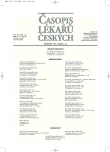-
Medical journals
- Career
Paranoid Syndrome, Paranoid Reaction, Paranoia
Authors: P. Pavlovský
Authors‘ workplace: Psychiatrická klinika 1. LF UK a VFN, Praha
Published in: Čas. Lék. čes. 2006; 145: 178-180
Category: Review Article
Overview
The term paranoid is derived from the Greek word paranoia meaning nadnese. It does not only mean self-reference, but there are various personality features as they are hostility, a tendency towards aggressiveness, irritability, a lack of sense of humour, feelings of overestimation of one-self and a tendency towards accusations. These features may appear also within normal psychology and they becomeclinically important after thein increase of intensity and conspicuousness (los sof hearing, long-term abuse of alcohol and psychostimulants) and organic disorders of the brain may contribute to the development of paranoidity. A mechanism of projection is considered as a decivise factor from the point of view of dynamic psychiatry. Clinically unimportant sign sof paranoidity can be observed due to unusual situations. If a paranoid reaction becomes more serious, formation of a paranoid delusion should be taken to account. In our koncept the term paranoid and paranoidity should be used only as a psychopathological term.
Key words:
paranoid syndrome, development of paranoia, biological cause of paranoidity, mechanism of projection, formation of delusion, paranoid disorders in ICD-10.
Labels
Addictology Allergology and clinical immunology Angiology Audiology Clinical biochemistry Dermatology & STDs Paediatric gastroenterology Paediatric surgery Paediatric cardiology Paediatric neurology Paediatric ENT Paediatric psychiatry Paediatric rheumatology Diabetology Pharmacy Vascular surgery Pain management Dental Hygienist
Article was published inJournal of Czech Physicians

-
All articles in this issue
- Role and Future of Public Health in the European Context
- Brain Diseases and Modern-day Society
- Paranoid Syndrome, Paranoid Reaction, Paranoia
- New Questions and Their Solution in Eating Disorders
- Photodynamic Therapy Used in Dermatology – Futher Method Development
- Contemporary Alternatives in the Diagnostics and Therapy of Female Androgenetic Alopecia
- Present Status of Abdominal Laparoscopy
- Mutations in Tumor Suppressor Gene NBS1 in Adult Patients with Malignancies
- Development of Incidence of Post-dural Puncture Headache in Patients Undergoing Caesarean Section in Spinal Anaesthesia at the Department of Obstetrics and Gynecology in Olomouc during 2003–2004
- Chronic Post-mastectomy Pain
- Percutaneous Sacroplasty in Sacral Insufficiency Fracture Treatment
- Journal of Czech Physicians
- Journal archive
- Current issue
- Online only
- About the journal
Most read in this issue- Paranoid Syndrome, Paranoid Reaction, Paranoia
- Chronic Post-mastectomy Pain
- Percutaneous Sacroplasty in Sacral Insufficiency Fracture Treatment
- Development of Incidence of Post-dural Puncture Headache in Patients Undergoing Caesarean Section in Spinal Anaesthesia at the Department of Obstetrics and Gynecology in Olomouc during 2003–2004
Login#ADS_BOTTOM_SCRIPTS#Forgotten passwordEnter the email address that you registered with. We will send you instructions on how to set a new password.
- Career

